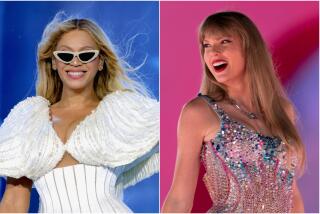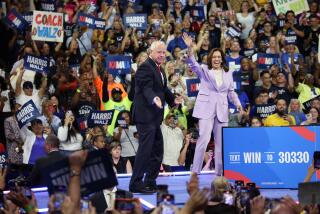First Lady’s Trip to China Hinges on Policy Debate : Asia: Decision on whether to go to women’s conference is tied to effort to free jailed human rights activist. GOP opposes Mrs. Clinton’s attendance.
- Share via
WASHINGTON — The advance teams have been laying the groundwork for First Lady Hillary Rodham Clinton in Asia. The State Department has been cranking out briefing materials on China for her to read.
But with only two weeks to go, the Clinton Administration still hasn’t decided whether the First Lady should attend the United Nations Conference on Women in Beijing. The decision has been swept up in the crosscurrents of U.S. relations with China--and in intense domestic politics surrounding that policy.
The focus of debate is whether Mrs. Clinton’s participation would undercut U.S. efforts to obtain the freedom of Harry Wu, the Chinese American human rights activist who had helped U.S. and British television networks uncover widespread abuse of prison labor in China. He was arrested on espionage charges when he tried to enter China once again in June at a remote border crossing.
Mrs. Clinton’s attendance at the Beijing women’s conference “would unfortunately communicate the perception that she’s unconcerned with Harry’s fate, which I think is untrue,” said Jeff Fiedler of the AFL-CIO, who is a friend of Wu’s. Rep. Nancy Pelosi (D-San Francisco) said that Mrs. Clinton’s presence “would give the repressive Chinese regime an unprecedented propaganda victory.”
Proponents counter that the Administration should give higher priority to improving its troubled ties with China.
“I don’t think it’s wise to allow the fate of one individual, who knew the risks he was running, to be the sole determinant of our relations with China,” said Arthur Hummel, former U.S. ambassador to China.
Jonathan Pollack, of the RAND Corp., observed: “The United States needs to send assurances to China that we wish them no malign intent. If we would like the Chinese to behave like a responsible great power, it would behoove us to treat them like one.”
The debate has taken on a highly political tone: Senate Majority Leader Bob Dole of Kansas, the leading GOP presidential candidate, is among those who have opposed any American attendance at the women’s conference while Wu is still jailed. Republican leaders recall how Clinton, in the 1992 presidential campaign, accused then-President George Bush of “coddling dictators” in Beijing.
“It would be wrong to attend a human rights conference when an American citizen is unjustly detained,” Dole said. “No improvement in relations [with China] will be possible as long as he is detained.”
Indeed, the Wu case has extraordinary political implications in Washington because it brings together conservative Republicans and left-wing Democrats. Conservatives view Wu’s case through the filter of anti-communism; Democrats see it in terms of human rights and support for organized labor. Because of his campaign against goods made in Chinese prisons, Wu enjoys strong support from the AFL-CIO.
Within the Administration, some cautious officials are said to be warning that Mrs. Clinton’s attendance in Beijing is fraught with policy risks too. In the recent past, high-level visitors to China have sometimes been confronted by the sort of surprises that demanded instant, delicate policy decisions.
In 1989, Soviet leader Mikhail S. Gorbachev visited Beijing just as Chinese demonstrations in Tian An Men Square were peaking; he had to struggle to avoid offending either his Chinese hosts or the hundreds of thousands of Chinese demonstrators. In 1994, U.S. Secretary of State Warren Christopher was embarrassed when Chinese security officials suddenly began rounding up dissidents before and during his trip to Beijing.
What will Mrs. Clinton do about demonstrations or other political upheavals at the women’s conference? What if China engages in a crackdown on dissidents or even puts Wu on trial while she is there?
Will she be invited to a cozy meeting or banquet with a top Chinese leader, and how should she respond? When Bush sent National Security Adviser Brent Scowcroft to Beijing in December, 1989, and he was photographed toasting Chinese leaders at a banquet, it created a political furor in Washington.
Over the past few days, U.S. officials have been arguing that she is going more to the women’s conference than to China.
“We believe that this is an important conference,” said State Department spokesman David Johnson. “It’s a conference that’s not about China, it’s a conference that’s about women, and it’s one that’s taking place in China.”
U.S. officials also have suggested that there are other high-level visitors to China who may bring up Wu’s case directly with Chinese leaders. Several members of Congress will be visiting China in the next few weeks.
*
On Monday, Christopher and Deputy National Security Adviser Samuel R. Berger met with Mrs. Clinton at the White House to talk about whether she should go to China. No one will say what advice they gave. Said one Administration official: “The call is basically up to the First Lady.”
It may be, however, that the White House is delaying any decision because it is hoping China will release Wu in the next few days.
More to Read
Sign up for Essential California
The most important California stories and recommendations in your inbox every morning.
You may occasionally receive promotional content from the Los Angeles Times.













